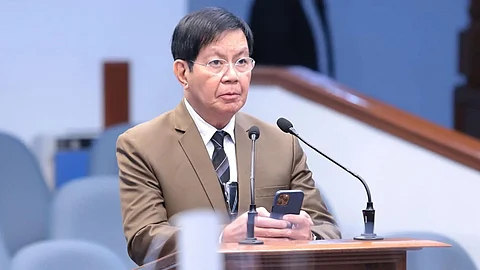
- NEWS
- the EDIT
- COMMENTARY
- BUSINESS
- LIFE
- SHOW
- ACTION
- GLOBAL GOALS
- SNAPS
- DYARYO TIRADA
- MORE

Amid a wave of alleged corruption in flood control projects across the country, Senator Panfilo “Ping” Lacson is calling for greater cooperation and transparency among government agencies to curb what he says is systemic collusion enabling substandard and even non-existent infrastructure projects.
Lacson, speaking days after his 20 August privilege speech, said new reports of irregularities continue to reach his office — each one dismissed as an “isolated case,” but collectively pointing to a deeper issue.
“Isolated case here, isolated case there, isolated cases everywhere. Maybe we should start looking for an isolated case of a corruption-free, properly implemented flood control project,” Lacson quipped in a post on X Thursday morning.
Lacson singled out the Department of Public Works and Highways (DPWH) and the Philippine Contractors Accreditation Board (PCAB) as key agencies allegedly involved in the irregularities.
He noted that despite repeated offenses, some contractors continue to secure large government projects, and sometimes through questionable accreditation renewals.
During a Senate interpellation, Lacson criticized the PCAB, an agency under the Department of Trade and Industry, for what he described as an “accreditation-for-sale” scheme.
“If we can conduct a good record check and background investigation and see that a company is blacklisted, we can block its registration as a corporation,” he said.
According to Lacson, private contractors have disclosed that PCAB officials offered to process requirements like bank certifications for a P2-million fee.
“So, close coordination and cooperation among different agencies of government is best. The agencies should not collude. Instead, they should provide checks and balances,” Lacson emphasized.
Senator Risa Hontiveros, responding to Lacson's speech, questioned how biddings are allegedly fixed to favor select contractors and why accountability remains elusive.
She raised concerns about the effectiveness of blacklisting when banned firms simply create new corporate identities to regain access to public contracts.
“The real culprit is collusion,” Lacson replied, as he reiterated the need to strengthen the PCAB’s vetting process, including background checks in coordination with the Securities and Exchange Commission (SEC) to flag blacklisted companies attempting re-entry.
Senate Minority Leader Vicente Sotto III supported Lacson’s call, pointing out that a contractor linked to a ghost project in Bulacan — the one inspected by President Marcos — had their PCAB license renewed through 2027.
“How can this happen?” Sotto asked, urging longer blacklisting periods and tighter oversight on contractor eligibility.
Lacson said the time has come to revisit Republic Act 4566, the law that governs contractor licensing in the Philippines. He argued that current policies are outdated and prone to abuse.
"I think we should revisit RA 4566 to check these anomalies. We must update the law," he said, supporting Sotto’s proposal to extend blacklisting terms to three to five years and limit the number of projects one contractor can take on.
Lacson also warned of contractors using interlocking directorships, with the same individuals sitting on the boards of multiple firms, to gain undue advantage in bidding processes. He described this as a tactic used by "unscrupulous corporations that deal with government, particularly flood control projects.
He said these issues should be tackled in the upcoming Senate Blue Ribbon Committee hearings, where the DPWH, PCAB, SEC, and other involved agencies will be invited to explain their roles in project implementation and oversight.
“This is a practice committed by unscrupulous corporations that deal with government, particularly flood control projects,” he said
